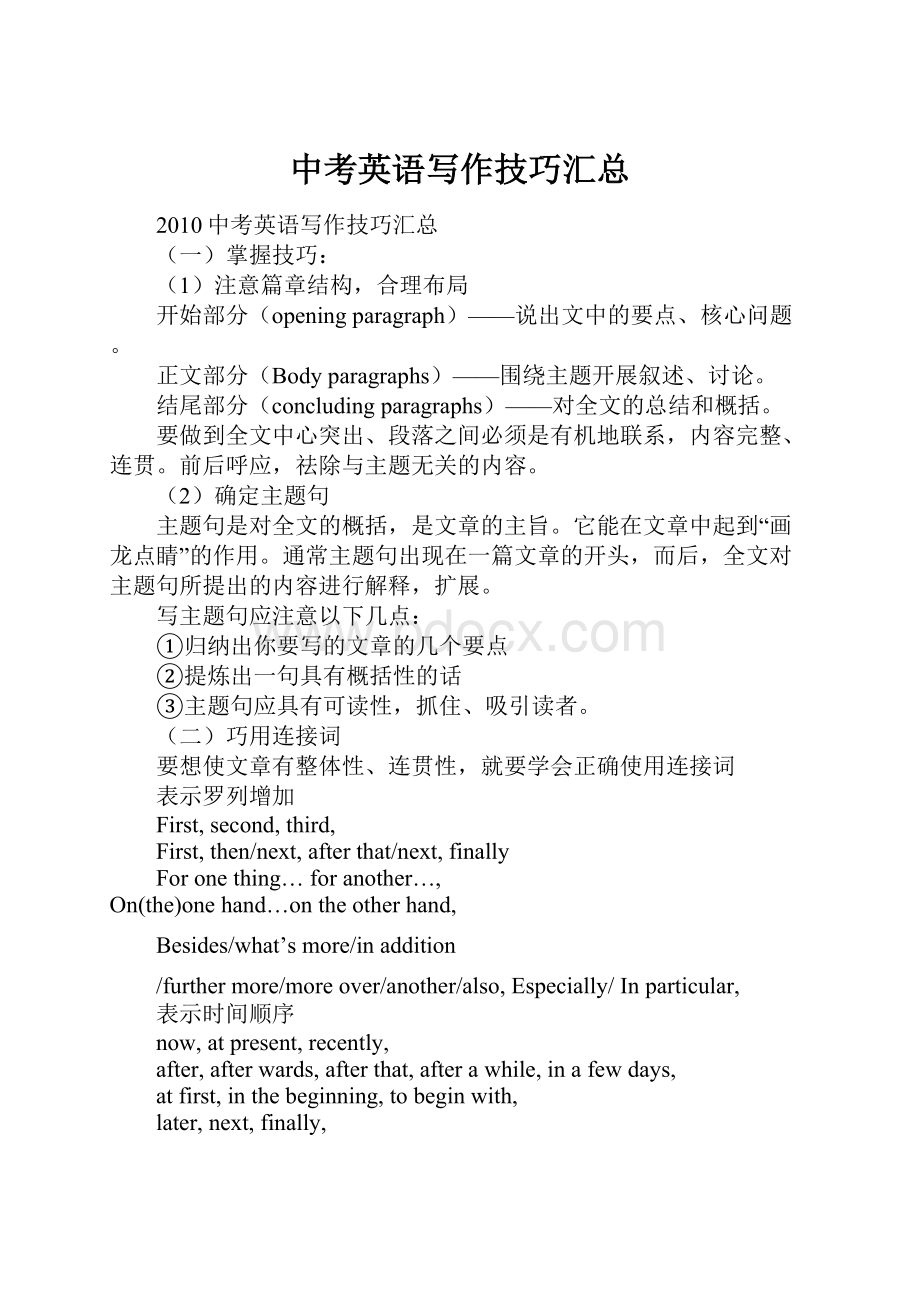中考英语写作技巧汇总.docx
《中考英语写作技巧汇总.docx》由会员分享,可在线阅读,更多相关《中考英语写作技巧汇总.docx(14页珍藏版)》请在冰豆网上搜索。

中考英语写作技巧汇总
2010中考英语写作技巧汇总
(一)掌握技巧:
(1)注意篇章结构,合理布局
开始部分(openingparagraph)——说出文中的要点、核心问题。
正文部分(Bodyparagraphs)——围绕主题开展叙述、讨论。
结尾部分(concludingparagraphs)——对全文的总结和概括。
要做到全文中心突出、段落之间必须是有机地联系,内容完整、连贯。
前后呼应,祛除与主题无关的内容。
(2)确定主题句
主题句是对全文的概括,是文章的主旨。
它能在文章中起到“画龙点睛”的作用。
通常主题句出现在一篇文章的开头,而后,全文对主题句所提出的内容进行解释,扩展。
写主题句应注意以下几点:
①归纳出你要写的文章的几个要点
②提炼出一句具有概括性的话
③主题句应具有可读性,抓住、吸引读者。
(二)巧用连接词
要想使文章有整体性、连贯性,就要学会正确使用连接词
表示罗列增加
First,second,third,
First,then/next,afterthat/next,finally
Foronething…foranother…,
On(the)onehand…ontheotherhand,
Besides/what’smore/inaddition
/furthermore/moreover/another/also,Especially/Inparticular,
表示时间顺序
now,atpresent,recently,
after,afterwards,afterthat,afterawhile,inafewdays,
atfirst,inthebeginning,tobeginwith,
later,next,finally,
immediately,soon,suddenly,allofasudden,atthatmoment,assoonas,themomentformnowon,fromthenon,atthesametime,meanwhile,
till,not…until,before,after,when,while,asduring,
表示解释说明
now,inaddition,forexample,forinstance,inthiscase,moreover
furthermore,infact,actually
表示转折关系
but,however,while,though,or,otherwise,onthecontrary,ontheotherhand,incontrast,despite,inspiteof,eventhough,except(for),insteadofcourse,afterall,
表示并列关系
or,and,also,too,notonly…butalso,aswellas,both…and,either…or,neither
…nor
表示因果关系
because,becauseof,since,nowthat,as,thanksto…,dueto…,therefore,asa
result(of),otherwise,so…that,such…that
表示条件关系
as(so)longas,onconditionthat,if,unless
表示让步关系
though,although,as,evenif,eventhough,whether…or…,however,whoever,
whatever,whichever,wherever,whenever,nomatterhow(who,what,which,where,when,
whom)
表示举例
forexample,forinstance,suchas…,take…forexample
表示比较
besimilarto,similarly,thesameas,incontrast,comparedwith(to)…justlike,
justas,
表示目的
forthisreason,,forthispurpose,sothat,inorderto,soasto,
表示强调
indeed,infact,surely,certainly,nodoubt,withoutanydoubt,truly,
obviously,aboveall,
表示概括归纳
inaword,inshort,inbrief,onthewhole,generallyspeaking,inmyopinion,asfar
asIknow,Asweallknow,ashasbeenstated,asIhaveshown,finally,atlast,insummary,inconclusion,
(三)掌握常用句型:
下面只列举比较常用的。
1.inorderto
为了实现他的梦想,他学习非常努力。
Heworkedveryhardinordertorealizehisdream.
2.inorderthat
她拼命干活以便到六点时把一切都准备就绪。
Sheworkedhardinorderthateverythingwouldbereadyby6o’clock..
3.so…that
他们太累了,除了伸懒腰什么都做不了了。
Theywereallsotiredthattheycoulddonothingbutyawn.
4.such…that
天气非常冷,以致于街上一个人都没有。
Itwassuchacolddaythattherewasnobodyonthestreet.
5.wouldratherdo…thando
他宁愿听他人讲而不愿自己说。
Hewouldratherlistentoothersthantalkhimself.
6.preferdoingtodoing
他宁愿在精心准备后去做报告。
Heprefersmakingspeechesaftercarefulpreparation.
7.prefertodo…ratherthando
比起女人,男人总是宁可在家睡觉也不愿花那么多时间来购物。
Comparedwithwomen,menalwaysprefertosleepathomeratherthanspendsomuchtime
shopping.
8.notonly…butalso
在短短的三年的时间里她不但完成了所有课程,而且还获得了博士学位。
Injustthreeyears,shehadnotonlyfinishedallthelessons,butalsoreceivedher
doctor’sdegree.
9.either…or
如果考试过关,你可以买一个MP3或去云南玩一趟。
YoucouldeitherbuyanMP3orgotoYunnanforavisitifyoupasstheexam.
10.Neither…nor
他是一个无聊的人,既不爱娱乐,也不爱读书。
Heisaboringman.Helikesneitherentertainmentnorreading.
11.aswellas
他善良又乐于助人。
Hewaskindaswellashelpful.
12.…aswell
这个小孩活泼又可爱。
Thechildisactiveandfunnyaswell.
13.One…theother
你看见桌子上有两只笔吗?
一支是红色的,另一支是黑色的。
Haveyouseentwopensonthedesk?
Oneisred,theotherisblack.
14.Some…others
每个人都很忙,有些在读书,有些在写作。
Everyoneisbusyinclassroom.Somearereading,othersarewriting.
15.make…+adj/n
我们所做的可以让世界更美丽。
Whatwedowillmaketheworldmorebeautiful.
16.not…until
直到他告诉我发生的事,我才了解真相。
Ididn’tknowthetruthuntilshetoldmewhathappened.
17.asif
他夸夸其谈好像什么事都知道。
Hetalksalotasifheknowseverything.
18.Itisnouse(good)doing…
假装不懂规则是行不通的。
It’snousepretendingthatyoudidn’tknowtherules.
19.findit+adjtodo…
我觉得作听力时有必要作笔记。
Ifinditnecessarytotakedownnoteswhilelistening.
20.Itis+timesince…
我已经有两年没见他了。
ItistwoyearssinceIlastmethim.
21.Itis+timewhen…
我到电影院时已经八点钟了。
Itwas8o’clockwhenIgottothecinema.
22.Itis+timebefore…
不久我们就会再见面的。
Iwon’tbelongbeforewecanmeetagain.
23.Itis…that…
我最珍视的是友谊。
ItisfriendshipthatIvaluemost.
24.Itis+n/adj+that/todo…
每个人都必须懂得如何使用计算机
Itisamustthateverybodyshouldknowhowtousecomputers
中考英语考点专项复习之反意疑问句
本文主要对中考英语考点专项复习之反意疑问句做重点介绍,反意疑问句是指先陈述一件事,再用省略的一般疑问句附加在其后构成的疑问句。
通常用yes/no回答。
对于反意疑问句,我们必须知道的基本规则:
1、反意疑问句的陈述部分如果是肯定,附加的一般疑问句就用否定形式;如果陈述部分是否定,则附加部分用肯定形式。
(我们可以这样记忆这条规则:
前肯后否,前否后肯)
如:
Thisisabook,isn’tit?
Thisisnotabook,isit?
YoucanspeaksomeEnglish,can’tyou?
Youcan’tspeakanyEnglish,canyou?
2、反意疑问句的附加部分(疑问句)的主语一定要用人称代词充当(前句为therebe句型除外,在那样的情形里,句尾还用there),如果后部分是否定,一定要用缩写形式。
(前部分为Iam…时,后部分用aren’tI?
)
如:
Iamateacher,aren’tI?
Therewillbeameeting,won’tthere?
3、如何回答反意疑问句对于很多同学来说可能会是一个问题,因为在这点上英语和汉语的习惯不同。
下面我们来进行对比。
汉语:
“你不是一个老师,是吗?
”“是的,我不是。
”
英语:
Youaren’tateacher,areyou?
No,I’mnot.
汉语:
“你不是一个老师,是吗?
”“不,我是。
”
英语:
Youaren’tateacher,areyou?
Yes,Iam.
通过对比,我们可以发现汉语的答语可以前面是否定、后面是肯定,而英语绝对不行,前后必须一致,要么全部用肯定,要么全部用否定。
这一点请同学们务必要用心琢磨,因为这是中考中的一个常见考点。
我在回答反意疑问句的时候,总是先考虑答语的后部分到底该用肯定还是否定,然后再给这个答语的前面加上Yes或者No,大家不妨也和我一样考虑这样的问题。
其它应该知道的规则:
1.陈述部分里的代词noone(nobody)、everyone(everybody)、someone(somebody)、anyone(anybody)等,在最后部分用he或者they代替。
如:
Everyoneshouldworkhard,shouldn’the/they?
2.must作必须讲,后部分用must或者need;mustnot作禁止讲,后部分用may。
如:
Wemustkeepquietinthelibrary,mustn’t/needn’twe?
Theymustnotparktheircarshere,maythey?
3.有时候前面的陈述部分看似陈述形式,但其中含有seldom(不常)、hardly(几乎不)、nobody(没人)、nothing(没有什么)、never(从不)、none(一个也没有)、neither(两者都不)、few(几乎没有)、little(几乎没有)等表示否定意义的词,此时要把陈述部分看成否定,其后的附加疑问句要用肯定形式;某些句子里含有dis-或者un-这样表示否定意义的前缀的复合词(如dislike和unusual),还是要把它看成肯定句。
如:
Heisneverlateforschool,ishe?
Hecanhardlybelieveyou,canhe?
Thereisnothingnewintoday’snewspaper,isthere?
Itseldomrainshereinspring,doesit?
Itisveryunusual,isn’tit?
4.“(Don’t)+动词原形+其他”这样的祈使句无论否定还是肯定,反意疑问句的疑问部分都用“willyou”。
Openthedoor.—Openthedoor,willyou?
Don’ttalkinclass.—Don’ttalkinclass,willyou?
5.Let’sdo和Letusdo
Let’s…(包含对方,所以后部分用shallwe?
)
Letus…(不包含对方,所以后部分用willyou?
)
如:
Let’splayfootball,shallwe?
这句话的含义是说话者邀请听话人和他一起去踢足球,所以后部分用人称代词we。
Letusplayfootball,willyou?
这句话的含义是说话者请求听话人允许他去踢足球,所以后部分用人称代词you。
6.把感叹句看成一般意义的陈述句,然后照一般的规则处理。
如:
Whatagoodboyheis,isn’the?
Howhardheworks,doesn’the?
7.英语里没有amnot的缩写形式,一般用aren’t。
如:
Iamyourfriend,aren’tI?
8.前部分有“过去常常干某事usedtodosth.”这样的结构,后半部分用didn’t或者usedn’t。
如:
Youusedtogetupearlyinthemorning,didn’t/usedn’tyou?
9.前部分含有“Ithink…”,如“Ithinkheisright.”,应该把它理解成“Heisright”,然后做相应的疑问部分。
因为think后的宾语从句不能含有not,所以“Idon’tthinkheisright.”应该看成“Heisn’tright”,然后做相应的疑问部分。
如:
Ithinkheisright,isn’the?
Idon’tthinkheisright,ishe?
下面我们来做一些练习:
1.Thecomputerisveryusefulinourlife,______it?
A.isn’tB.wasn’tC.hasn’tD.doesn’t
前部分是肯定形式,一般现在时,所以选择A。
2.---Shedidn’tcometoschoolyesterday,didshe?
---______,thoughshewasnotfeelingwell.
A.No,shedidn’tB.No,shedidC.Yes,shedidn’tD.Yes,shedid
从though(尽管)可以看出她还是来了学校,所以反意疑问句答语的后部分肯定是shedid,然后在它之前应该Yes,所以答案应该选择D。
3.Thereislittlemilkinthebottle,______?
A.isn’titB.isitC.isn’tthereD.isthere
前部分含有表示否定意义的little,所以选择D。
4.Hehasfewfriendsinthenewschool,______?
A.hasheB.isheC.doesn’theD.didhe
前部分含有表示否定意义的few,所以选择A。
5.“You’veneverseendinosaureggs,haveyou?
”
“_______.HowIwishtovisittheDinosaurWorld.”
A.Yes,IhaveB.No,Ihaven’tC.Certainly,IhaveD.Ofcourse,Ihaven’t
从乙的回答可以看出乙没有见过恐龙蛋,所以选择B。
6.Boblikestravelingverymuch,_____he?
A.isn’tB.isC.doesn’tD.does
前部分是肯定,谓语动词为单数第三人称形式的一般动词,所以选择C。
7.Kate’sneverseenChinesefilm,______?
A.hasn’tsheB.hassheC.isn’tsheD.isshe
前部分含有表示否定意义的never,所以选择B。
8.Fewofthemhurtthemselvesintheaccidentlastnight,_______?
A.don’ttheyB.didn’ttheyC.didtheyD.dothey
前部分含有表示否定意义的few,时态为一般过去时,所以选择C。
9.-----Lindahadnothingforbreakfastthismorning,______?
-----No.Shegotuptoolate.
A.hadsheB.hadn’tsheC.didsheD.didn’tshe
前部分含有表示否定意义的nothing,时态为一般过去时,所以选择C。
10.Mr.KinghasneverbeentoFrance,______?
A.hasheB.hasn’tMr.KingC.hasn’theD.hasMr.King
前部分含有表示否定意义的never,句末一般为人称代词,所以选择A。
11.“Youneverhavenoodles,_____you?
”“No.Ionlylikerice.”
A.doB.don’tC.haveD.haven’t
前部分含有表示否定意义的never,时态为一般现在时,而且have在这里意思是“吃”,而不是“有”,所以选择A。
12.Hissisterhadabadcough,_____she?
A.wasn’tB.doesn’tC.hadn’tD.didn’t
前部分为肯定、一般过去时,而且had在这里表示得病,所以选择D。
13.Anelephantisstrong,______it?
A.doesn’tB.doesC.isn’tD.is
前部分是肯定,所以选择C。
14.Thetowngovernmentsetupanewmodernhospitalforthefarmers,_____?
A.doesitB.doesn’titC.diditD.didn’tit
前部分是肯定的一般过去时,所以选择D。
15.Don’tforgettoreturnthelibrarybook,_____?
A.willyouB.canyouC.doyouD.areyou
标准的祈使句,后部分一律用willyou,答案为A。
16.Petercouldhardlyseethewordsontheblackboard,_____?
A.didheB.couldn’theC.didn’theD.couldhe
前部分含有表示否定意义的hardly,所以选择D。
17.Mary’sbrotherhadatalkatschoolyesterdayafternoon,_______
A.hadheB.hadn’theC.didheD.didn’the
前部分为肯定,一般过去时,而且have表示的是进行活动的意思,所以选择D。
18.-----Lucydidn’tcometoschool,didshe?
----________.Shewasillinbed.
A.No,shedidB.Yes,shedid.C.No,shedidn’t.D.Yes,shedidn’t.
从乙的回答可以判断出Lucy没有上学,所以答案选择C。
19.Therewillbeavolleyballmatchinourschool,_______?
A.bethereB.isthereC.willthereD.won’tthere
前部分为肯定的therebe,时态为一般将来时,选择D。
20.Alicestayeduplatelastnight,_______?
A.didn’therB.didn’tAliceC.didsheD.didn’tshe
前部分为肯定,一般过去时,答案为D。
21.---Let’sgoandfly